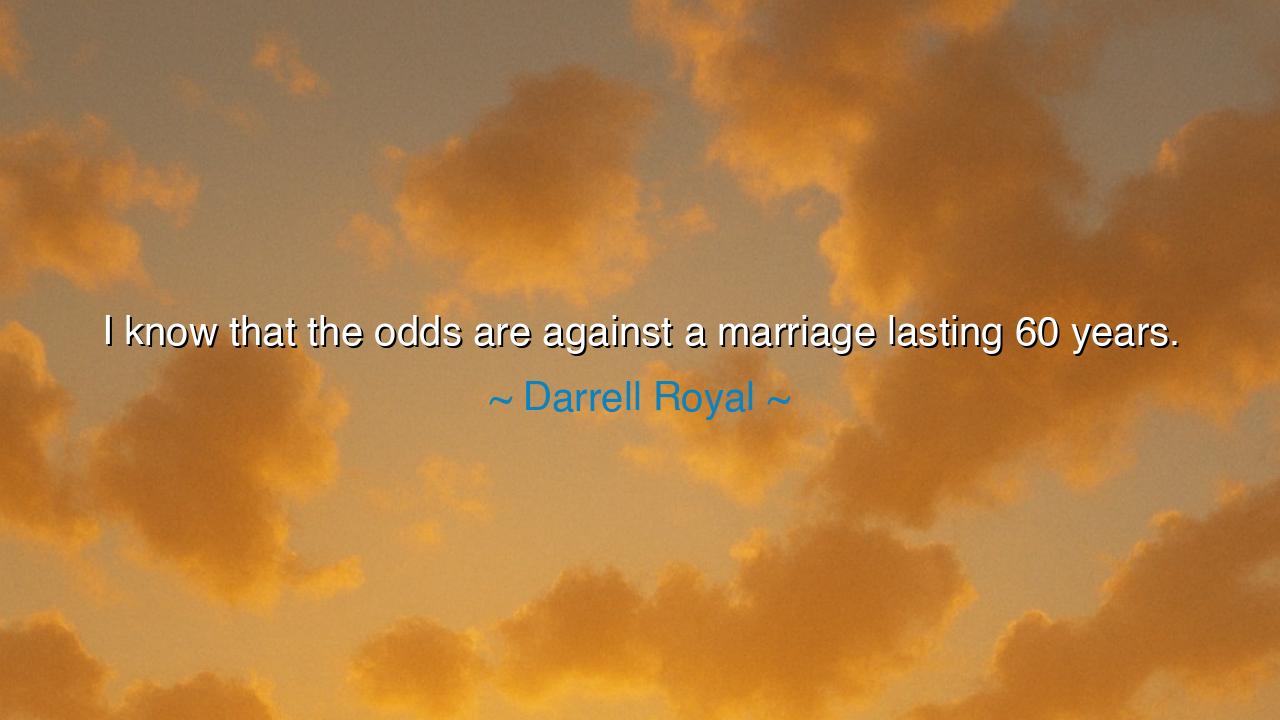
I know that the odds are against a marriage lasting 60 years.






In the vast history of human relationships, few unions are as sacred or as fraught with challenge as marriage. The words of Darrell Royal—"I know that the odds are against a marriage lasting 60 years"—reveal a deep understanding of the complexity and resilience required to sustain such a union through the trials of time. Sixty years of marriage is not a mere milestone—it is a testament to the power of commitment, endurance, and the ability to navigate the storms that inevitably come with living a life intertwined with another. Royal’s statement is a humble acknowledgment that, while we may hope for lifelong partnership, the challenges and odds of sustaining it for such a long period are formidable.
In the ancient world, marriage was viewed as a sacred bond that not only united two people but also their families, their lands, and their futures. In Homer’s Odyssey, the union of Odysseus and Penelope stood as a shining example of loyalty and faithfulness, even though the years of separation and adversity tested their bond. Penelope, waiting faithfully for her husband’s return, embodied the essence of endurance and trust in the face of uncertainty. Her commitment was not simply a matter of love, but of duty to the promise she made. This story reflects the depth of what Royal refers to—marriage is not a simple or easy path, but one that requires sacrifice, resilience, and, most importantly, a willingness to persevere through whatever challenges may come.
Consider also the enduring love of Queen Victoria and Prince Albert of England. Their marriage, which lasted for over 20 years, was a union rooted in both affection and duty. Despite the pressures of royal life, they built a relationship based on mutual respect and shared responsibility. When Prince Albert died, Queen Victoria was so deeply affected by the loss that she remained in mourning for the rest of her life. Their marriage was not just about personal happiness, but about a shared purpose and vision that tied their lives together. This example of commitment and endurance can be seen as a precursor to Royal’s reflection—the odds are against any marriage lasting for six decades, yet it is the strength of shared vision and commitment that makes such a union possible, even if rare.
Royal’s acknowledgment of the odds against lasting love for 60 years speaks to a truth that resonates throughout history: that marriage is a journey of perseverance and compromise, where the couple must work together not only in moments of joy but also through trials, conflict, and inevitable changes. In the story of marriage, endurance is the key to survival. One need only look at the struggles faced by Henry VIII and Catherine of Aragon, whose marriage, though initially a powerful union, eventually fell apart under the weight of betrayal and unmet expectations. Their marriage, unlike those of Victoria and Albert, was unable to withstand the challenges of emotional and political tension, showing that even the strongest unions can face great odds if the bond is not nurtured with respect, trust, and mutual understanding.
The deeper lesson in Royal’s words is one of humility and realism about the nature of human connection. Marriage, like all things of true worth, requires constant effort and commitment. It is not enough to rely on the initial passion or even the shared history; a lasting marriage is built on the daily choices to respect, support, and work toward a common goal, no matter how the years unfold. The challenges of life—be they health, finances, or personal growth—must be navigated together, with an understanding that the journey is long and requires both patience and dedication. The odds against a marriage lasting 60 years are high, but the rewards of endurance are immeasurable.
For those who seek to build relationships that endure, the lesson is simple yet profound: commitment to one another, day after day, is the true test of love. It is not enough to simply fall in love; one must continue to grow in love, to nourish the relationship through both good times and bad, always returning to the promise of loyalty and respect. Like Penelope, whose faithfulness stood as an anchor throughout her trials, we too must find ways to remain faithful to the promises we make, even when the road is long and the journey uncertain.
In your own life, ask yourself: Are you committed to the people you love, not just in moments of happiness, but in times of struggle? Do you view relationships as a journey requiring patience, effort, and endurance? Remember that marriage, like all meaningful connections, is a long path, one that requires constant tending, whether through communication, support, or the willingness to overcome the odds together. By committing to each other with the same strength and loyalty as those who have walked this path before, we can build marriages that, though tested by time, continue to grow stronger with each passing year. Just as Royal wisely observed, it is the commitment to one another through all of life's challenges that makes a marriage truly last.






AAdministratorAdministrator
Welcome, honored guests. Please leave a comment, we will respond soon